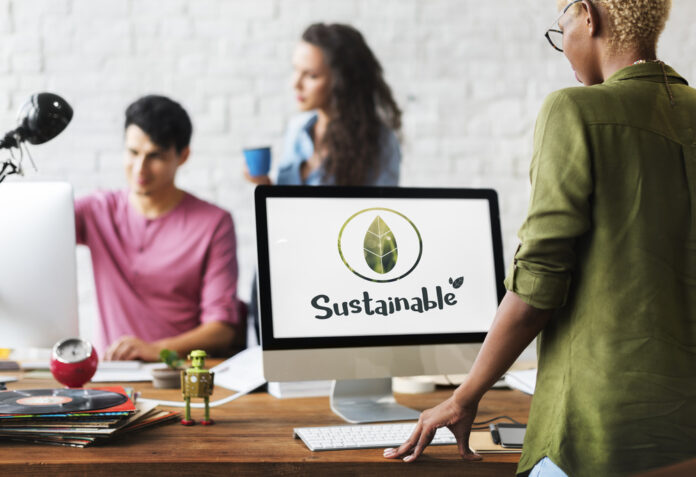For entrepreneurs preparing their startups for the post-pandemic market, an exciting change has taken place. Many forward-thinking founders feel the tug of responsibility as it relates to the climate change crisis, whether that means creating startups that add to the solution or, at the very least, creating products that don’t make the problem worse.
Embedding sustainable practices into a venture from the beginning can be an added expense. Often, it means paying suppliers more, investing in new technologies, and spending extra time and resources to think through every step.
In the past, that’s been a difficult expense to communicate to partners, supporters, and/or stakeholders. When early-stage founders are dreaming of their ventures from their home offices, it’s easy to have the intention to go green. But when that already-impossible startup journey is complicated by extra obstacles and costs, it can feel like the price tag for sustainable solutions is just too hard to justify. Even when the founding team remains committed, the challenges of staying environmentally and socially responsible can be daunting, and can keep a home-office dream from becoming a full-fledged success.
But for all of its disorientation and despair, the COVID-19 crisis has had one important silver lining; consumer sentiment around sustainability has been forever changed. Months of reduced activity left tangible signs of environmental reprieve, 75% of consumers now report a heightened environmental awareness, with 95% of consumers indicating that awareness includes concentrated thought about how their actions are adding to the problem.
Already, that mindset shift has showed up in their purchase behavior, influencing market demand in ways that can’t be ignored. A report by S&P Global substantiated the advantage that environmental, social, and governance (ESG) companies had over their market peers; in the first year of the pandemic, funds that prioritized ESG companies significantly outperformed the broader market. A 2020 survey by IBM explains further: 80% of surveyed consumer indicated that sustainability was important for them, and 70% of those who understood its important would be willing to pay a premium of 35% on average to patron brands that are socially and environmentally responsible.
It seems we’ve entered a new normal, one in which investors and stakeholders don’t any need convincing to take the more sustainable route. In fact, in the post-pandemic market, the question of sustainable operations vs. maximum profits is no longer relevant—those two priorities aren’t at odds. For a startup to be relevant and profitable in the after-COVID age, founders need to turn their attention to the sustainability of their offerings. Below are a few important places to begin.
What Do Certified B Corporations and Great Chocolate Chip Muffins Have in Common?
Everyone knows there are two ways to make a muffin. Grocery stores are stocked with ready-to-make boxes—just add water and sprinkle a few chocolate chips on the top. Then there are those great chocolate chip muffins, the ones we can all remember buying from a bakery or enjoying warm from the oven on a Sunday afternoon. Those muffins might have the same simple recipe, but they begin with high quality ingredients—and with the chocolate chips mixed right in from the beginning.
In order to thrive in the post-COVID market, founders want to think about their recipe for sustainability along the lines of the latter—the great muffins. Profits can still be the goal, but it’s crucial that the founding team turns their care and attention to every consideration, all the way through. How will this company support its staff, its clients, its suppliers, its community at large? What kind of environmental standards have been established from the beginning? What are our goals as far as our carbon footprint, and how will we measure the impact we’re having as time goes on?
Not only does this strategy lead to a more sustainable operation, it will also be repeatedly rewarded by consumers. Given the choice between a box recipe and a homemade muffin, every person on the planet would reach for the latter. Similarly, real sustainability is something consumers can pick up on. In order to win that market reward, more and more companies are slapping a Corporate Sustainability Statement on their website and calling it a day. But that’s like sprinkling the chocolate chips on at the end, and it’s not a reliable indication that the company operates without incurring a cost to people or planet. Before long, consumers catch on, and take their business to companies and products they can stand behind.
A B-Corporation certification, on the other hand, helps consumers understand that the company has been held to the highest standard. B-Corps undergo an extensive audit for companies that are serious about sustainability and transparency. For founders who want to go the extra mile and help their future clients make sustainable choices, they can begin with a self-assessment to make sure they’re on the right track. The next step is a formal verification process with B Labs. Startups need 12 months of business activity before they’re able to complete the application process, but they can undergo an impact assessment tool to make it that much easier when the time comes.
The Human Side of Sustainable
As talent continues to redistribute after the disruption of the pandemic, founders are quickly learning that there are a few new non-negotiable aspects of the employee experience. The more accommodative, flexible, and engaged a startup can be in the health, wellbeing, and well-roundedness of their team, the better their corporate culture and the more their team will be able to give back.
By now, founders have learned that lesson, and many new-to-market startups are capitalizing on the flexibilities of a hybrid model to make sure their teams can access their work whenever and wherever it makes sense for them. But a sometimes underdeveloped part of this company alignment is the founder’s own principles. What begins as a great idea can easily be commercialized and developed further and further away from the original intention. For a founder that’s aware of the problem, and interested in being part of the climate change solution, maintaining a business that comes at an environmental cost won’t be mentally sustainable. Burnout, disengagement, and spiritual deterioration are all signs that the company has gone in a direction that is no longer aligned. For founders who are willing to slow down, trust the process, and build a sustainable company from the ground up, a fulfilling and rewarding startup experience awaits.
Find a Home-Based Business to Start-Up >>> Hundreds of Business Listings.
















































Workplaces are prioritizing more and more the need to put their money where their mouths are – not just paying lip service about their values, but actually being conscious about their supply chain and ensuring that the companies they do business with align with their corporate values and culture.
Celebrities or famous personalities and ordinary people are identified in several categories. Celebrities are the elite or ones who have a prodigious influence on the general public. Famous people range from artists all the way right down to actors. Ordinary people are common citizens of the planet.
edgeofstars(dot)com